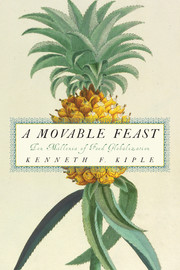Book contents
- Frontmatter
- Contents
- Preface
- Acknowledgments
- INTRODUCTION: FROM FORAGING TO FARMING
- Ch. 1 LAST HUNTERS, FIRST FARMERS
- Ch. 2 BUILDING THE BARNYARD
- Ch. 3 PROMISCUOUS PLANTS OF THE NORTHERN FERTILE CRESCENT
- Ch. 4 PERIPATETIC PLANTS OF EASTERN ASIA
- Ch. 5 FECUND FRINGES OF THE NORTHERN FERTILE CRESCENT
- Ch. 6 CONSEQUENCES OF THE NEOLITHIC
- Ch. 7 ENTERPRISE AND EMPIRES
- Ch. 8 FAITH AND FOODSTUFFS
- Ch. 9 EMPIRES IN THE RUBBLE OF ROME
- Ch. 10 MEDIEVAL PROGRESS AND POVERTY
- Ch. 11 SPAIN'S NEW WORLD, THE NORTHERN HEMISPHERE
- Ch. 12 NEW WORLD, NEW FOODS
- Ch. 13 NEW FOODS IN THE SOUTHERN NEW WORLD
- Ch. 14 THE COLUMBIAN EXCHANGE AND THE OLD WORLDS
- Ch. 15 THE COLUMBIAN EXCHANGE AND NEW WORLDS
- Ch. 16 SUGAR AND NEW BEVERAGES
- Ch. 17 KITCHEN HISPANIZATION
- Ch. 18 PRODUCING PLENTY IN PARADISE
- Ch. 19 THE FRONTIERS OF FOREIGN FOODS
- Ch. 20 CAPITALISM, COLONIALISM, AND CUISINE
- Ch. 21 HOMEMADE FOOD HOMOGENEITY
- Ch. 22 NOTIONS OF NUTRIENTS AND NUTRIMENTS
- Ch. 23 THE PERILS OF PLENTY
- Ch. 24 THE GLOBALIZATION OF PLENTY
- Ch. 25 FAST FOOD, A HYMN TO CELLULITE
- Ch. 26 PARLOUS PLENTY INTO THE TWENTY-FIRST CENTURY
- Ch. 27 PEOPLE AND PLENTY IN THE TWENTY-FIRST CENTURY
- Notes
- Index
Ch. 16 - SUGAR AND NEW BEVERAGES
Published online by Cambridge University Press: 22 August 2009
- Frontmatter
- Contents
- Preface
- Acknowledgments
- INTRODUCTION: FROM FORAGING TO FARMING
- Ch. 1 LAST HUNTERS, FIRST FARMERS
- Ch. 2 BUILDING THE BARNYARD
- Ch. 3 PROMISCUOUS PLANTS OF THE NORTHERN FERTILE CRESCENT
- Ch. 4 PERIPATETIC PLANTS OF EASTERN ASIA
- Ch. 5 FECUND FRINGES OF THE NORTHERN FERTILE CRESCENT
- Ch. 6 CONSEQUENCES OF THE NEOLITHIC
- Ch. 7 ENTERPRISE AND EMPIRES
- Ch. 8 FAITH AND FOODSTUFFS
- Ch. 9 EMPIRES IN THE RUBBLE OF ROME
- Ch. 10 MEDIEVAL PROGRESS AND POVERTY
- Ch. 11 SPAIN'S NEW WORLD, THE NORTHERN HEMISPHERE
- Ch. 12 NEW WORLD, NEW FOODS
- Ch. 13 NEW FOODS IN THE SOUTHERN NEW WORLD
- Ch. 14 THE COLUMBIAN EXCHANGE AND THE OLD WORLDS
- Ch. 15 THE COLUMBIAN EXCHANGE AND NEW WORLDS
- Ch. 16 SUGAR AND NEW BEVERAGES
- Ch. 17 KITCHEN HISPANIZATION
- Ch. 18 PRODUCING PLENTY IN PARADISE
- Ch. 19 THE FRONTIERS OF FOREIGN FOODS
- Ch. 20 CAPITALISM, COLONIALISM, AND CUISINE
- Ch. 21 HOMEMADE FOOD HOMOGENEITY
- Ch. 22 NOTIONS OF NUTRIENTS AND NUTRIMENTS
- Ch. 23 THE PERILS OF PLENTY
- Ch. 24 THE GLOBALIZATION OF PLENTY
- Ch. 25 FAST FOOD, A HYMN TO CELLULITE
- Ch. 26 PARLOUS PLENTY INTO THE TWENTY-FIRST CENTURY
- Ch. 27 PEOPLE AND PLENTY IN THE TWENTY-FIRST CENTURY
- Notes
- Index
Summary
SUGAR
Dazzling-white sugar, ground down from huge Dutch sugar loaves … sweeter and more yielding than Venetian sugar loaves, the white gold of confectioners and pastry-cooks.
(Piero Camporesi, Exotic Brew, 157)Sugar – a preservative, a fermenting agent, a sweetener of food and drink without changing the flavor – has revolutionized the food processing industry; and sugar cane was the most revolutionary of all plants to reach the Americas. Today sugar – actually the chemical sucrose, extracted from the cane – is the world's best-selling food, surpassing even wheat.
This giant grass with stems juicy with a sappy pulp is generally believed to be a native of New Guinea, although India and China are often put forward as alternative cradles because it was cultivated in both places in ancient times. Much later (around 500 bce) the Persians came across sugarcane growing in the Indus Valley and, although humans had doubtless coaxed sweet juice out of bits of cane by chewing on them for eons, the Indus Valley growers may have been the first to use the cane in a more sophisticated fashion by pressing it for its juice, then concentrating that juice by boiling it.
In any event, the Persians quickly adopted cane cultivation and, by the seventh century ad, had refined the process sufficiently to produce a nearly white loaf. Some of these sugar loaves entered Europe through Venice as one more spice called “white salt.”
- Type
- Chapter
- Information
- A Movable FeastTen Millennia of Food Globalization, pp. 163 - 183Publisher: Cambridge University PressPrint publication year: 2007



